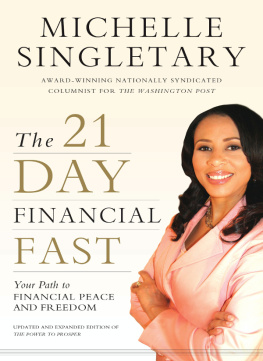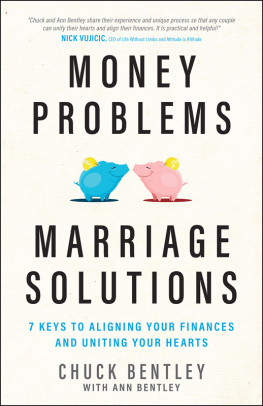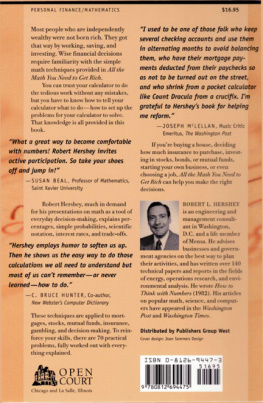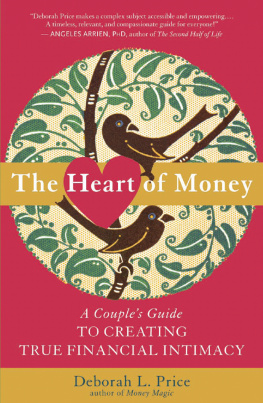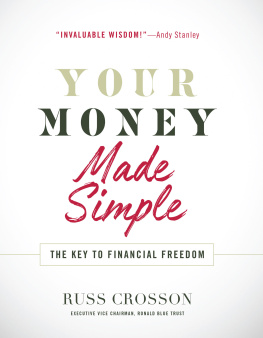
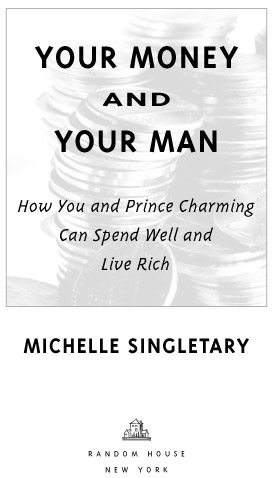
Contents
To Kevin.
Thank you for being
the mountain I can lean on.
Introduction
In all the years Ive been a personal finance columnist for The Washington Post, Ive received scores of letters and e-mails from couples (many during the regular online discussions I host). Ive had the chance to see how many couples mismanage their money.
Its heartbreaking.
Again and again, I see what happens when couples fail to communicate or compromise, marry people who dont share their financial goals, or act like theyre roommates, not people partnered for life.
Ive heard from couples with good incomes who are near bankruptcy because they cant budget. Ive heard from couples who make major purchases without consulting their spouse. Ive heard from couples who hide purchases. Ive heard from couples who try to outspend each other like children fussing about who got a bigger piece of pie.
Ive heard from women who boast about having secret bank accounts because they dont fully trust the men they chose to marry. Ive heard from couples who argue over who should pay what percentage of the household bills. Ive heard from couples full of resentment because one person makes more than the other.
I want to smack them.
Heres a universal truth about your money and your man: Money may not buy love, but fighting about it will bankrupt your relationship.
How is it that people can proclaim to love one another, sleep with each other, and even have children together, yet wont do what it takes to stop fighting about money?
I know why.
And deep down, you know why, too.
Couples fight about money because they have issues.
Perhaps your husband was overindulged as a child. As an adult he feels entitled to the best this world has to offer, regardless of whether he earns enough to pay for it all. Or maybe your boyfriend grew up not having much of anything, and worries now about having enough money all the time. The result is, hes so frustratingly frugal that when he pinches a penny, he dents it.
The fights are not about the money. They are rarely about the money. For example, I received a letter from a reader who wrote: I grew up very poor and never wanted to live a poor life as an adult. I was able to get myself through college and get a decent paying job. I married quite young, at twenty-one. He was twenty. Twenty years later, we are getting divorced. And the number one reason was the issue of money.
Specifically, the woman wrote, the divorce was precipitated by her husbands unplanned purchase of a truck. He just went out and bought it, she said. I feel horrible to have my marriage dissolve over something like this, but I felt like he had a total lack of respect toward the family financial situation. We had $20,000 in credit card debt and no money in savings. On top of that, he purchased season tickets to a major sports event. I emotionally left the relationship at that point. My family is broken. My heart is broken.
You might think this couples marriage was ruined by money problems. Sure, the letter writers husband put his family deeper in debt by buying a truck they couldnt afford. But the breakup wasnt really about the money. It was about this couples failure to work as a team. The husband wanted what he wanted when he wanted it. Damn anybody else.
It was the last line in this womans letter that confirmed what Ive always known about love and money. She wrote: In my case it was a case of disrespect from my spouse.
Its a lack of communication and compromise that torpedoes relationships, not a lack of money. Many couples think that if they made more money, their financial issues would go away. They wouldnt. The problems would just become more expensive.
This book is aimed at women in two different situations. Its for women who need to start paying attention to the red flags that indicate theyve got some serious money issues with their boyfriends or fiancs. Its also for married women who know that issues precipitated by money may be weakening their marriage or, even worse, destroying it.
Although there is little data showing that money conflicts lead directly to divorce, money is still one of the top reasons why couples fight. Surveys show that the biggest strain on a relationship is managing finances, followed by compatibility issues.
A well-known childrens rhyme comes to mind when I think of couples and money:
First comes love,
Then comes marriage,
Then comes baby in the baby carriage.
With that rhyme in mind, Ive written Your Money and Your Man in four parts. The first part, First Comes Love, addresses the financial issues that often drag dating couples down. One of the most important lessons from the first part is to watch carefully how your man handles his finances. His money management is the best barometer of whats in store for your relationship in the long term. If he jokes about not balancing his bank account or that his credit cards are always maxed out, most likely your man is not going to keep his money right. Trust me, Prince Charming wont seem so enchanting when hes messing up the checkbook and the two of you are being hit with bounced-check fees every month.
In the first part, Ill also discuss the dangers of cosigning for your partner before marriage, prenuptial agreements, the financial pitfalls of shacking up (oh, sorry, I mean cohabitation), the dos and donts of sharing intimate details of your finances, and the financial conversations you should have after getting engaged.
In the second part of the book, Then Comes Marriage, Ill discuss the foolishness of overspending for a wedding, as well as joint accounts, secret accounts, and household budgets. Ill also talk about getting out of debt.
The third part, Then Comes Baby in the Baby Carriage, will give you tips on how to teach your children about money and pay for their education.
Finally, the fourth part, How You and Prince Charming Can Spend Well and Live Rich, addresses saving, investing, retirement planning, and financial prioritiesas well as what to do when living happily ever after means separately.
Ultimately, what I hope is that you and your man will find a way to have a relationship that is financially balanced. That balance can happen if you follow these three simple Cscommunicate, compromise, and set common goals.
When it comes to your money and your man, you will not live rich if you dont find a way to communicate honestly about your financial differences. You will not live rich if you dont learn to compromise. And you will not live rich if you dont set common financial goals.
Follow the three Cs and you will be able to trust your man with your heart and your money.
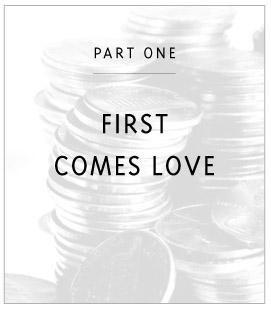
A MAN IS NOT A PLAN
There are a lot of women who dont think they can become prosperous on their own. They think a man is a plan.
As a single thirty-something female, I am growing increasingly disgusted with female friends who keep putting off financial planningeverything from contributing to a 401(k) to buying a house, one reader wrote to me. They say, This will all be taken care of when I get married. These are grown women with real jobs who seem to think the little black dress they use to potentially attract Mr. Right is a better investment than real estate.
Next page


